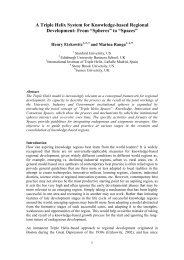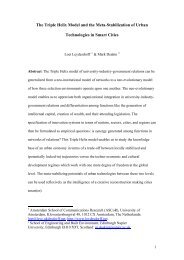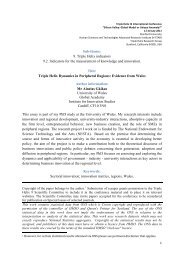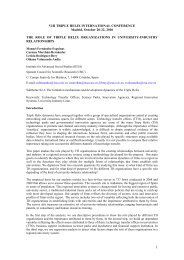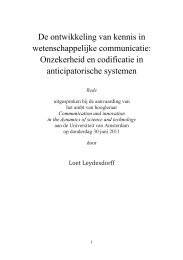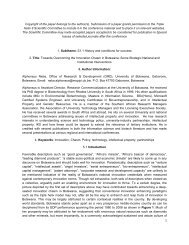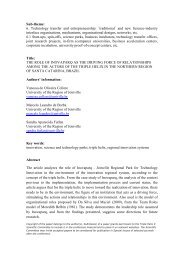TRIPLE HELIX noms.pmd
TRIPLE HELIX noms.pmd
TRIPLE HELIX noms.pmd
Create successful ePaper yourself
Turn your PDF publications into a flip-book with our unique Google optimized e-Paper software.
O-060Successes and Failures of an Intermediary in Triple Helix Relationships inDeveloping Countries: the Case of Thailand’s Food IndustryPatarapong Intarakumnerd, College of Innovation, Thammasat University, Banghok, ThailandPeechaya Jirathumkitkul, Thitapha Smitinont, Somchai Chatratana, Technology Management Centre, National Science &Technology Development Agency, Banghok, ThailandGenerally the extent of market and systemic failures in developing countries are much larger than developed ones (Leff, 1976and Chaminade, and Edquist, 2006). Innovation systems and triple helix relationships in developing countries can be characterizedas weak and fragmented because of high degree of such failures (Intarakumnerd et.al., 2002 ). To mitigate these failures,different government policies and more effort are needed. Market mechanisms and the standard government intervention in theforms of laws, regulations and incentives are not sufficient to solve these problems. The role of intermediaries is highlighted asan important actor instrumental in mitigating failures. Dodgson and Bessant (1996) indicate that intermediary organizations canfacilitate innovation process by performing activities bridging user needs and supply side. They can help to identify specificneeds of users, select appropriate options, link with external knowledge sources and so on. These intermediary organizationscan take many forms such as research technology organizations (RTOs), industrial and trade associations, professionalassociations, private foundations and so on. Nonetheless, the actual operation and, hence, lesson learned from the work ofintermediaries have not been seriously conducted, especially in the context of developing countries.The aim of this paper is to study the roles of intermediaries in creating and strengthening triple helix relationships and mitigatingsystemic failures in a developing country. The role of Thailand’s Industrial Technology Assistance Program (ITAP) under NationalScience and Technology Development Agency in the food industry will be highlighted as a case study. ITAP has been chosenas a case study because it has been operating since 1992 and has developed technical consultant projects with more than1000 firms since then. Therefore, it has enough track record to evaluate successes and failures. ITAP’s operating model wasbased on the “demand driven” and “sharing responsibility” concept that each participating company must pays the expenses ofthe technical experts who could be from within or outside the country. ITAP pays up to 50% of the expense (but not exceed500,000 Baht) to the company, in the form of reimbursement. The reason behind this concept is to induce the SMEs to upgradetheir technological capability in manufacturing and generates their product and process innovation, and at the same time tomake sure that a participating company had the real need and commitment. Recently number of local experts from Thaiuniversities has increased considerably. ITAP has played important roles in initiating and enhancing university and industrylinkages which are normally weak in Thailand. Triple Helix relationships among universities, industrial firms and ITAP wereformed.Methodologically, we have taken two approaches. Firstly, we examined almost 100 projects in the food industry within the year2007-2008 and draw general observations on factors determining successes and failures of these projects. Secondly, weselected a few success and failure cases for comparative purposes to verify our general observation and pinpoint detailedcharacteristics leading to failures and successes. With-in case analysis has been done as well, since we also investigatedhistorical development steps of selected cases. Some began with failures but became successes later because they havelearned the lessons well.From our study, the successes and failures depend very much on:A) The willingness, readiness, and learning and absorptive capacity of participating firms in understanding and prioritizing ownproblems, providing enough and continuous financial and human resources to work with outside experts from universities,gaining participation from relevant departments of the company, and subsquent execuation and follow up after the collaborativeprojects finished.B) Capability and creditability of university experts, namely academic capability, relevant industrial experiences, degree ofattention and time spent in the projects.C) Capability and dedication of ITAs (Industrial Technology Assistants working for ITAP), namely, matching ability (enoughability to match expectations of firms with capabilities and limitations of university experts), monitoring ability (enough ability toset projects’ milestones and monitor accordingly), and problem-solving ability (ability to solve problems emerged during theprojects and fine-tune different expectations of both sides).This study has policy and management implications on triple helix practices, especially on selecting the right participating firmsand university experts and successful project implementations. The aforementioned capabilities of intermediaries themselvesneed to be enhanced, so that they can effectively functions. Government policies should pay attention on this aspect beyondstandard polices addressing market failures.Madrid, October 20, 21 & 22 - 2010160



